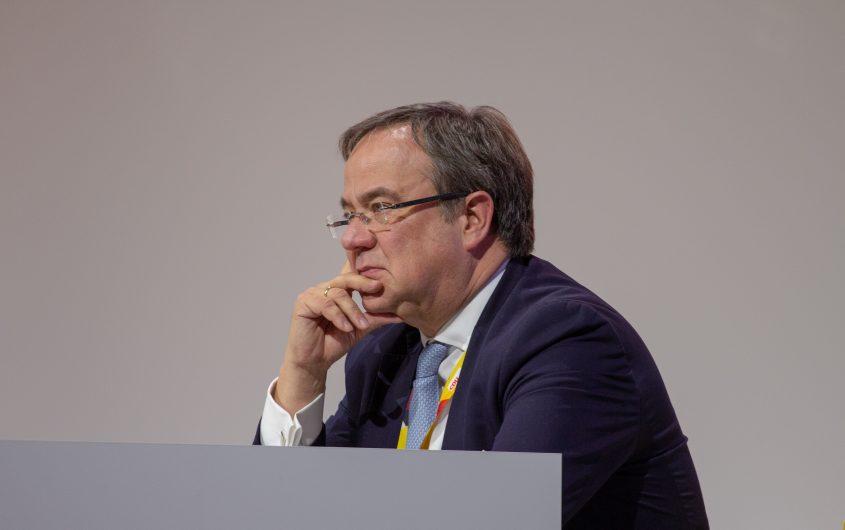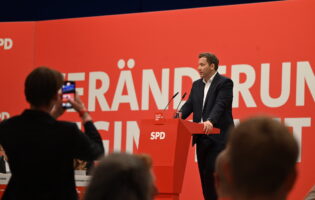
Olaf Kosinsky under licence CC BY-SA 3.0-de
Germany’s Election Year Enters New Gear

Jeff Rathke
President of AGI
Jeffrey Rathke is the President of the American Institute for Contemporary German Studies at the Johns Hopkins University in Washington, DC.
Prior to joining AICGS, Jeff was a senior fellow and deputy director of the Europe Program at CSIS, where his work focused on transatlantic relations and U.S. security and defense policy. Jeff joined CSIS in 2015 from the State Department, after a 24-year career as a Foreign Service Officer, dedicated primarily to U.S. relations with Europe. He was director of the State Department Press Office from 2014 to 2015, briefing the State Department press corps and managing the Department's engagement with U.S. print and electronic media. Jeff led the political section of the U.S. Embassy in Kuala Lumpur from 2011 to 2014. Prior to that, he was deputy chief of staff to the NATO Secretary General in Brussels. He also served in Berlin as minister-counselor for political affairs (2006–2009), his second tour of duty in Germany. His Washington assignments have included deputy director of the Office of European Security and Political Affairs and duty officer in the White House Situation Room and State Department Operations Center.
Mr. Rathke was a Weinberg Fellow at Princeton University (2003–2004), winning the Master’s in Public Policy Prize. He also served at U.S. Embassies in Dublin, Moscow, and Riga, which he helped open after the collapse of the Soviet Union. Mr. Rathke has been awarded national honors by Estonia, Latvia, and Lithuania, as well as several State Department awards. He holds an M.P.P. degree from Princeton University and B.A. and B.S. degrees from Cornell University. He speaks German, Russian, and Latvian.
__
The CDU/CSU Struggles to Regain Traction
Germany’s national election in September will produce a new chancellor, as Angela Merkel retires from public life. Her conservatives took a shellacking in two state elections on March 14, a reminder that the potential for a political shakeup is brewing. The country’s politics during her tenure have been characterized largely by stodgy predictability – Merkel has governed for nearly sixteen years, most of them in an ideologically muddled Grand Coalition between her conservatives and the center-left Social Democrats. The consequences of the September 26 Bundestag vote will be enormous for Germany, Europe, the transatlantic relationship, and the global order the Biden administration wants to reshape with the help of its most important allies.
This year’s first concrete data points come from Baden-Württemberg and Rhineland-Palatinate, which together form Germany’s southwestern elbow, nestled along the Rhine and home to nearly one-fifth of the country’s population. The results appear wildly divergent at first glance: the Greens triumphed in Baden-Württemberg (population 11 million), while the Social Democrats prevailed in Rhineland-Palatinate (population 4 million). What they have in common is that Merkel’s Christian Democrats came away with a black eye in both. In each state, the CDU turned in its worst election performance in post-war history: 24 percent in Baden-Württemberg (a state the CDU once governed for 60 years straight); and 28 percent in Rhineland-Palatinate (the home state of Helmut Kohl, where the CDU used to score in the mid-30s even if they lost an election).
The coming days will be a battle of each party’s interpretation of the national significance of the outcome, but the dominant initial message is, as the SPD chancellor-candidate put it, that “a government without the CDU is possible.”
These results are a barometer of the national mood, albeit a very imperfect one. Andreas Kluth has written about the challenge of interpreting German tea leaves, and one should be careful not to overestimate the predictive potential of these contests for the upcoming federal election – for each victory like the Greens’ in Baden-Württemberg (33 percent), there is a setback such as their under-performing the polls in Rhineland-Palatinate and finishing with 9 percent. Similarly, incumbent SPD Minister-President Malu Dreyer won convincingly in the Rhineland (36 percent), but next door in Baden-Württemberg the Social Democrats limped home with 11 percent. The coming days will be a battle of each party’s interpretation of the national significance of the outcome, but the dominant initial message is, as the SPD chancellor-candidate put it, that “a government without the CDU is possible.”
The CDU is losing its momentum. Early in the pandemic, Merkel’s steady, rational leadership along with the national sense of a shared challenge bolstered CDU support, reaching as high as 40 percent in some polls last May. That bubble has burst, with the CDU now below 30 percent in the most recent survey. Several factors are dragging the CDU down: a third wave of COVID-19 infections has dampened the public mood and raised the prospect of new lockdowns. The slow progress of the vaccination campaign has demonstrated that despite its early successes containing the spread of the virus, Germany now is lagging many advanced countries (the temporary suspension of the use of the AstraZeneca vaccine on March 15 amid worry about blood clots may further slow the vaccination effort and deepen public concern). And outrage erupted recently when two members of the CDU/CSU Bundestag caucus admitted to profiting by brokering mask shipments during the pandemic; they were forced to resign in a scandal that could not have come at a more inopportune time. Altogether, the image of reliable competence Merkel and her Health Minister Jens Spahn built up in the early months of the pandemic has taken a huge beating.
With six months until the Bundestag election, the stakes could not be higher, and the field is increasingly open.
The elections in Baden-Württemberg and Rhineland-Palatinate, where strong incumbents were returned to power, demonstrate a personality-driven element in German politics. This highlights the crucial decision that the CDU and CSU must make in the next two months about who will lead the ticket as the conservatives’ chancellor candidate; with Merkel stepping aside, the conservatives will not benefit from the halo effect of her popularity anymore. Ambiguity about their election lineup will fuel discontent and further erode the CDU’s strength. Newly elected CDU Chairman Armin Laschet has been damaged somewhat by the poor March 14 results, but he has been in office less than two months and can deflect blame for this debacle. Bavarian CSU Chairman Markus Söder polls better than Laschet and has made decisiveness a part of his political brand – expect many commentators to argue his case in the coming weeks. As the leader of the larger party, Laschet has the stronger claim to the chancellor candidacy, as long as he retains the support of key state leaders within the CDU. If figures like Hesse Minister-President Volker Bouffier, Schleswig-Holstein Minister-President Daniel Günther, or Saxony Minister-President Michael Kretschmer begin to waver, Laschet may feel pressure to yield the baton to Söder.
In one respect, yesterday’s results may suggest a return to the pre-pandemic political balance. At the start of 2020, the increasingly crowded party landscape made a two-party coalition arithmetically difficult if not impossible. With the CDU’s recent deflation, a three-party coalition may be necessary to secure a majority (Merkel sought in 2017 to form a coalition with the Greens and the free-market FDP but the talks ultimately failed). At present, the only mathematical possibilities for a three-party coalition would be led by the CDU/CSU. But a small surge for the Greens, the SPD, or the FDP would change that equation. With six months until the Bundestag election, the stakes could not be higher, and the field is increasingly open.









